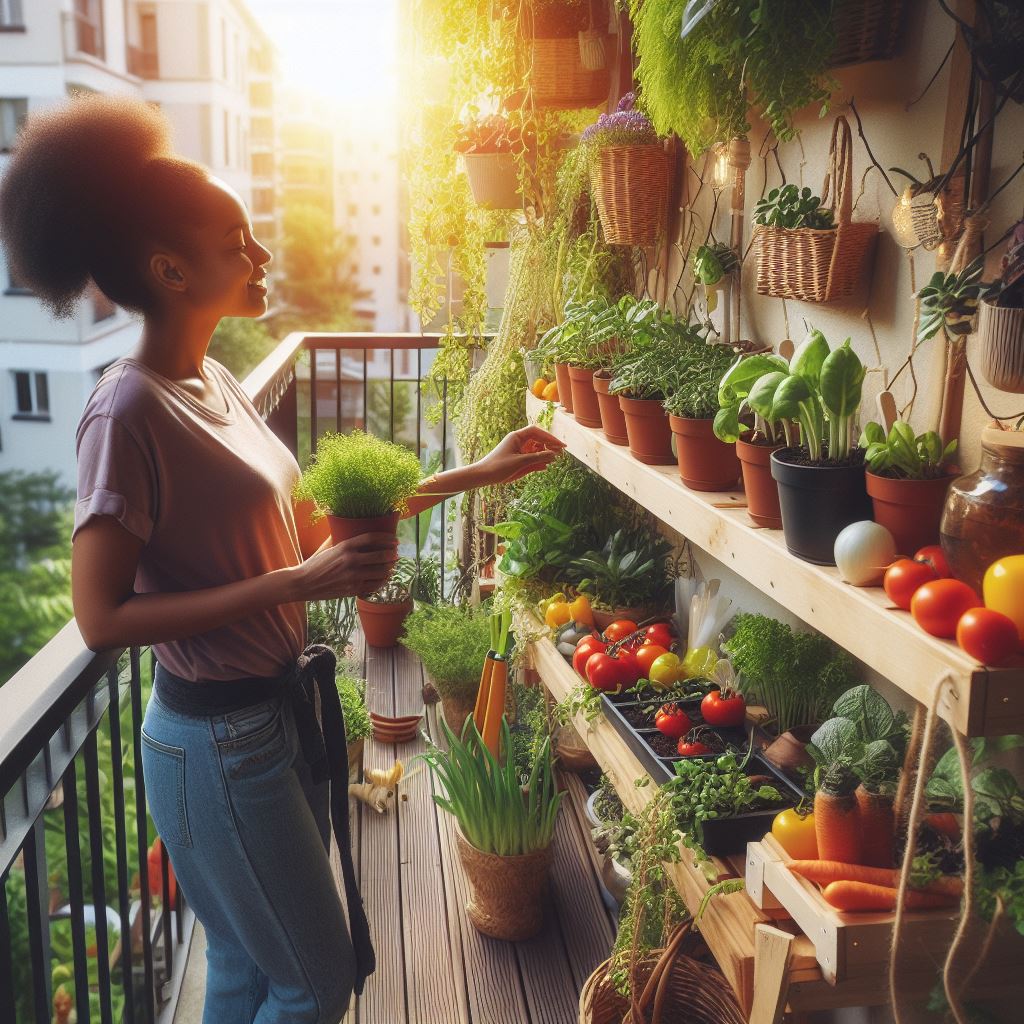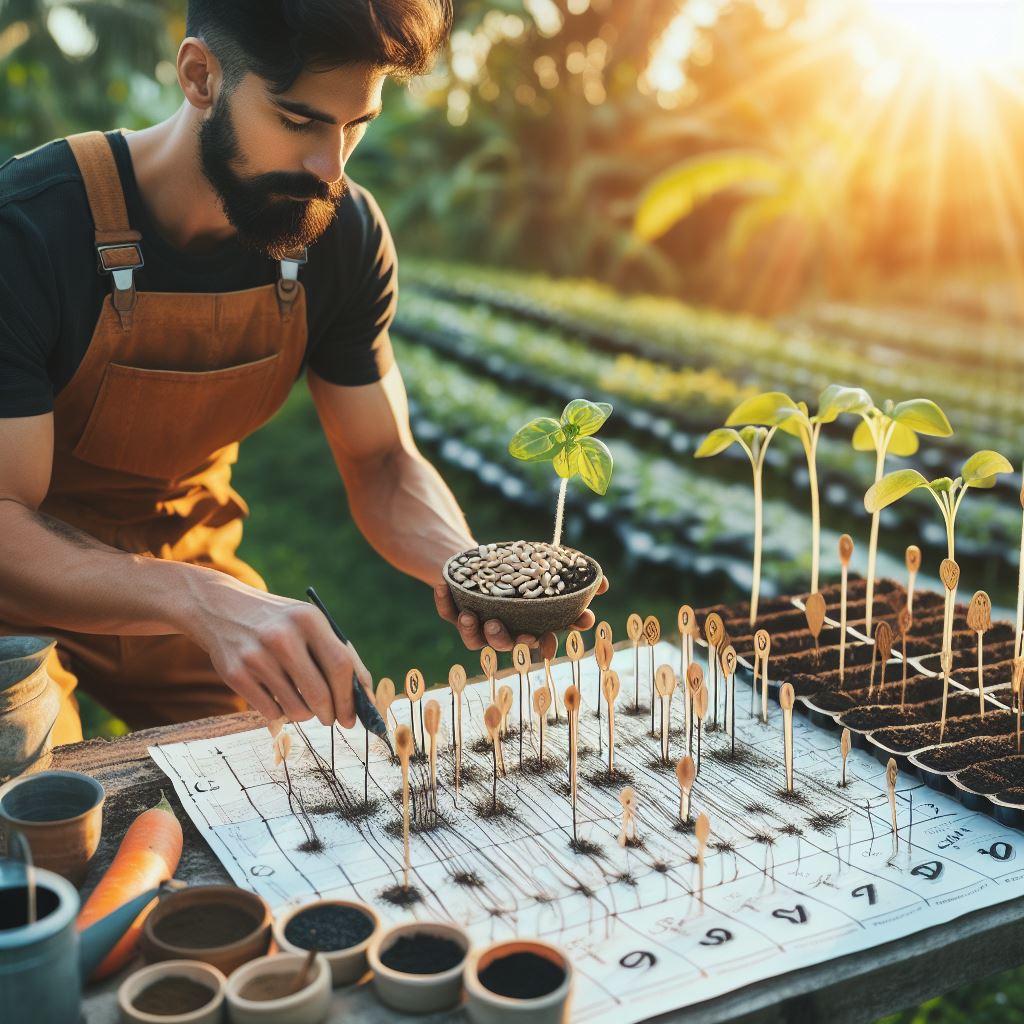Introduction
Balcony farming is a burgeoning trend among urban dwellers seeking to cultivate green spaces within limited areas.
With the ever-increasing population density in urban areas, space for traditional gardening is becoming scarce.
As a result, balcony farming has gained popularity as a practical solution to incorporate greenery and grow fresh produce in small spaces.
In today’s fast-paced urban lifestyle, many people find themselves living in apartments or condos with limited outdoor space.
However, the desire to connect with nature and enjoy the benefits of homegrown fruits, vegetables, and herbs remains strong.
This is where balcony farming comes into play, offering a way to transform even the smallest balcony or terrace into a vibrant and productive garden.
Importance of small space ideas for urban dwellers
The importance of small space ideas for urban dwellers cannot be overstated.
In densely populated cities, balconies and small outdoor areas are precious commodities.
They provide residents with a valuable opportunity to escape the concrete jungle and immerse themselves in nature.
Additionally, balcony farming allows individuals to take control of their food production, leading to increased self-sufficiency and reduced reliance on store-bought produce.
Furthermore, balcony farming promotes environmental sustainability by reducing food miles and carbon emissions associated with transporting produce from farms to cities.
By growing food locally, urban farmers contribute to a more eco-friendly lifestyle and minimize their ecological footprint.
Additionally, balcony gardens can serve as habitats for pollinators and beneficial insects, further enhancing urban biodiversity.
Moreover, balcony farming offers numerous health benefits for urban dwellers.
Growing your own fruits, vegetables, and herbs ensures access to fresh, nutritious produce free from harmful pesticides and chemicals.
It encourages a more active lifestyle, as tending to plants and gardening activities provide physical exercise and stress relief.
Additionally, spending time outdoors surrounded by greenery has been shown to improve mental well-being and reduce symptoms of anxiety and depression.
In summary, balcony farming is a practical and rewarding way for urban dwellers to utilize small outdoor spaces effectively.
By embracing small space ideas and incorporating greenery into their balconies and terraces, city residents can enjoy the benefits of homegrown produce, connect with nature, promote sustainability, and improve their overall health and well-being.
In the following section, we will explore various techniques, tips, and ideas for successful balcony farming in small spaces.
Benefits of Balcony Farming
Accessible fresh produce
- With balcony farming, you can have fresh produce right at your fingertips.
- No need to rely on grocery stores for fruits, vegetables, and herbs.
- You can harvest your crops whenever you need them, ensuring freshness and quality.
- It promotes a healthy diet by increasing your access to nutritious fruits and vegetables.
- You have control over the types of produce you grow, ensuring organic and pesticide-free options.
Cost-saving
- Balcony farming can help you save money on groceries in the long run.
- Buying fresh produce from stores can be expensive, while growing your own is cost-effective.
- You only need to invest in seeds, soil, containers, and basic gardening tools initially.
- Over time, you can save on buying expensive organic produce, as you can grow them yourself.
- Balcony farming also eliminates transportation costs associated with store-bought produce.
Health and well-being
- Engaging in balcony farming promotes physical activity and mental well-being.
- Gardening is a form of exercise that can help improve your overall fitness.
- Spending time in nature and taking care of plants can reduce stress and anxiety.
- It allows you to connect with the natural world and enjoy the therapeutic benefits of gardening.
- Balcony farming also provides a sense of accomplishment and satisfaction as you watch your plants grow.
Environmentally friendly
- Balcony farming contributes to environmental sustainability.
- Growing your own produce reduces the demand for mass-produced crops, resulting in less carbon footprint.
- It helps conserve water as you can control the amount used for irrigation.
- Balcony farming promotes biodiversity, attracting bees, birds, and beneficial insects to your space.
- By avoiding chemical pesticides and choosing organic practices, you protect the ecosystem.
In fact, balcony farming offers numerous benefits.
It provides accessible fresh produce, saving you money and promoting a healthier diet.
Engaging in balcony farming also promotes physical activity, mental well-being, and a sense of connection with nature.
Furthermore, it contributes to environmental sustainability by reducing the carbon footprint and conserving water.
So, start your own balcony farm and enjoy the many advantages it has to offer.
Read: Maximize Yields, Minimize Water in Urban Farms
Planning a Balcony Farm
By carefully planning your balcony farm, you can create a thriving and productive space even with limited area.
Assessing space and available sunlight
One key aspect to consider when planning your balcony farm is the available space and sunlight.
Before you get started, measure the size of your balcony to assess the amount of space you have for farming.
This will help you determine the number of containers and plants you can accommodate.
In addition to space, sunlight is crucial for the success of your balcony farm.
Observe the sunlight patterns on your balcony throughout the day to identify spots that receive at least 6-8 hours of direct sunlight.
This will ensure that your sun-loving crops receive the light they need to grow.
Choosing the right containers and materials
When it comes to choosing containers, opt for ones that are suitable for balcony farming.
Hanging baskets, pots, and troughs are popular choices.
Make sure the containers have proper drainage to avoid waterlogging, as excess water can harm the plants.
Additionally, if you have weight restrictions on your balcony, lightweight containers will be ideal.
Consider using eco-friendly materials for your containers, such as terracotta or recycled plastic.
These materials not only promote sustainability but also provide a visually appealing look to your balcony farm.
Selecting suitable plants for balcony farming
While selecting plants, be mindful of their suitability for container gardening.
Research different varieties that thrive well in containers and choose accordingly.
Also, consider the size of the plants when they reach full maturity to ensure they fit your balcony space without overcrowding.
For a diverse and vibrant balcony farm, include a mix of vegetables, herbs, and flowers.
This will not only add aesthetic value but also provide you with a variety of produce.
However, always ensure that the selected plants can thrive in the available sunlight and climate conditions.
Transform Your Agribusiness
Unlock your farm's potential with expert advice tailored to your needs. Get actionable steps that drive real results.
Get StartedConsidering the climate and microclimate
Understanding the climate of your area is important when planning a balcony farm.
Take into account the average temperature range and rainfall patterns.
Additionally, pay attention to the microclimate on your balcony, which may differ from the overall climate due to factors like shade from nearby buildings.
Choose plants that are well-suited to your specific climate and microclimate conditions to enhance their chances of survival and productivity.
In areas with extreme heat, you might need to consider using shade cloth or umbrellas to protect delicate plants.
In short, careful planning is essential for a successful balcony farm.
Assessing space and available sunlight, choosing the right containers and materials, selecting suitable plants, and considering the climate are all crucial factors to maximize productivity and create a thriving mini-farm on your balcony.
Read: Water-Wise Gardening: Simple Steps for Hobbyists

Small Space Ideas for Balcony Farming
When it comes to balcony farming, lack of space is often a challenge.
However, there are several small space ideas that can help maximize the productivity of your balcony garden.
Vertical gardening
One of the most popular small space ideas for balcony farming is vertical gardening.
This technique involves utilizing the vertical space available on your balcony.
You can achieve this by using hanging pots and baskets, arranging shelves or tiered planters, or constructing a trellis or vertical support for climbing plants.
Creative container gardening
Another creative solution for small space balcony farming is container gardening.
This method allows you to use various types of containers as planters.
You can make use of window boxes, repurpose household items as planters, or incorporate wall-mounted planters to make the most of your limited space.
Maximizing space with compact plant varieties
To further maximize your balcony space, consider choosing compact plant varieties.
Dwarf fruit trees, compact vegetables, and herbs, as well as miniature ornamental plants, are great choices for small balcony gardens.
These plants take up less space while still producing a bountiful harvest or adding beauty to your balcony.
Utilizing vertical space with hanging gardens
Utilizing vertical space is another great way to make the most of your balcony farming.
Install a wall-mounted pocket planter to grow a variety of plants vertically.
Create a hanging herb garden by suspending herb pots from your balcony ceiling or railing.
You can also incorporate a hanging hydroponic system, which allows you to grow plants without soil and utilizes vertical space efficiently.
In general, balcony farming can be a fulfilling and productive endeavor, even in small spaces.
By employing small space ideas such as vertical gardening, creative container gardening, maximizing space with compact plant varieties, and utilizing vertical space with hanging gardens, you can create a thriving balcony garden that provides fresh produce and a beautiful green space.
Read: Eco-Friendly Farming: Water Conservation Tricks
Tips for Successful Balcony Farming
Regular watering and proper drainage
- Water your plants regularly to keep them hydrated and healthy.
- Ensure proper drainage to prevent waterlogging, which can lead to root rot.
- Consider using self-watering containers or drip irrigation systems for more efficient watering.
- Check the moisture level of the soil by inserting your finger one inch deep, and water if it feels dry.
- Group plants with similar water requirements together to simplify watering routines.
Adequate sunlight and shade management
- Choose plants that are suitable for the amount of sunlight your balcony receives.
- Monitor the sun patterns on your balcony throughout the day to determine the best spots for plants.
- Consider using shade cloth or umbrellas to provide shade for plants that cannot tolerate direct sunlight.
- Rotate your plants occasionally to ensure they receive even exposure to sunlight.
- Be aware of any nearby structures or buildings that may cast shadows on your balcony and adjust plant placement accordingly.
Fertilization and soil maintenance
- Use a quality organic fertilizer to provide essential nutrients to your balcony plants.
- Follow the instructions on the fertilizer packaging to avoid over or under-fertilization.
- Regularly check the pH level of your soil and adjust if necessary using organic soil amendments.
- Continuously monitor the condition of your soil and replenish with fresh compost or potting mix as needed.
- Consider using slow-release fertilizers to provide a steady supply of nutrients over a longer period.
Pest control and prevention strategies
- Inspect your plants regularly for signs of pests such as aphids, mites, or fungal infections.
- Remove any affected leaves or plants to prevent the infestation from spreading.
- Encourage beneficial insects like ladybugs or lacewings that feed on garden pests.
- Consider using natural pest control methods such as neem oil or insecticidal soap.
- Avoid overwatering, as excess moisture can attract pests and create a favorable environment for their growth.
With proper care and attention, balcony farming can be a rewarding and fulfilling experience.
By following these tips for successful balcony farming, you can create a thriving green space in even the smallest of areas.
Remember to observe your plants closely, adjust their environment as needed, and stay proactive in pest control.
Happy gardening!
Read: Attracting Beneficial Insects to Gardens
Examples of Successful Balcony Farms
Community initiatives and urban gardening projects
Community initiatives and urban gardening projects have been successful in implementing balcony farming in small spaces.
- The “Garden on the Go” project in New York City has transformed unused balcony spaces into thriving gardens that provide fresh produce for local residents.
- In Chicago, the “City Farm” initiative has turned rooftops and balconies into productive urban farms, promoting sustainable living and community engagement.
- The “Garden for All” program in Seattle has set up community gardens on apartment building balconies, allowing residents to grow their own food and share gardening knowledge.
Personal balcony farming success stories
Individuals have also found success in balcony farming, utilizing their small spaces creatively.
- Mary, a city dweller in San Francisco, transformed her tiny balcony into a lush garden, growing herbs, veggies, and even small fruit trees.
- John, a busy professional in Tokyo, manages a balcony farm where he grows a variety of vegetables using vertical gardening techniques, maximizing the limited space available.
- Sarah, a student in London, grows beautiful flowers on her balcony, using hanging pots and trellises to make the most of the vertical space.
Notable examples of creative small space gardening
Besides balcony farming, there are other innovative approaches to small space gardening that have shown great success.
- Green walls or vertical gardens have become popular in urban areas, with plants growing vertically on the walls of buildings, adding beauty and improving air quality.
- Window box gardens have been embraced by urban dwellers, allowing them to grow herbs, flowers, and small vegetables right outside their windows.
- Container gardening is another successful method, where various plants are grown in pots, containers, or even recycled objects like old tires or barrels.
- Rooftop gardens have gained popularity, turning unused roof spaces into vibrant green areas that provide insulating properties and reduce stormwater runoff.
- Hanging baskets and planters are commonly used in small spaces, adding a touch of nature to balconies and porches.
In a nutshell, balcony farming has proven to be a successful way to utilize small spaces for gardening.
Community initiatives, personal success stories, and creative gardening methods have all contributed to the flourishing of plants in limited areas.
Whether it’s a community project or an individual effort, balcony farming offers a sustainable and rewarding solution to the challenges of urban living.
Find Out More: Small-Scale Farming Tips for a Thriving Garden
Conclusion
Recap of the benefits of balcony farming
Balcony farming offers numerous benefits such as efficient space utilization, fresh produce availability, and increased mental well-being.
Encouragement for readers to explore small space gardening
I urge you all to embrace small space gardening and experience the joy of growing your own food, even in limited spaces.
Final thoughts on the versatility and potential of balcony farming:
Balcony farming is a versatile and sustainable solution that can transform urban spaces into thriving green havens.
With creativity and enthusiasm, you can achieve incredible results in your balcony garden.
In closing, balcony farming is not just a trend, but a lifestyle that allows everyone to enjoy the benefits of gardening even in the smallest of spaces.
By implementing simple techniques and utilizing vertical space effectively, you can create a lush and productive garden that nourishes both the body and soul.
The sense of pride and satisfaction that comes with harvesting your own homegrown vegetables and herbs is unparalleled.
So, don’t hesitate to embark on this green journey and explore the endless possibilities of small space gardening.
Start cultivating your balcony garden today and witness the amazing transformation it brings to your life.
Remember, even a tiny balcony has the potential to become an oasis of greenery and a source of inspiration for everyone around you.
Embrace balcony farming and discover the beauty of growing your own food right at home!




